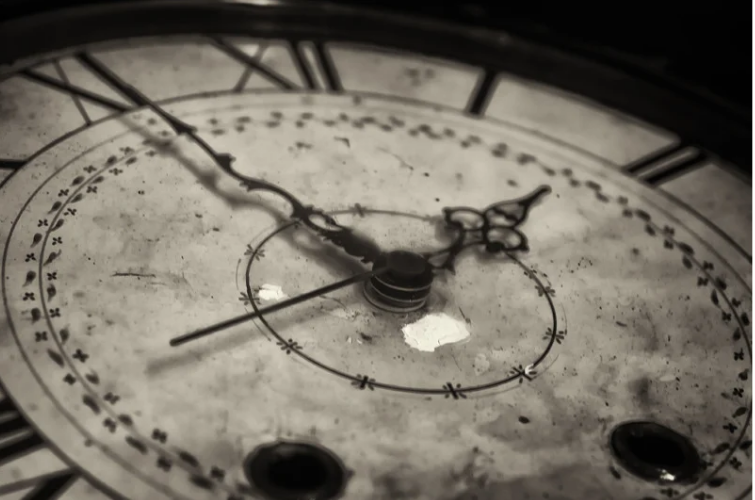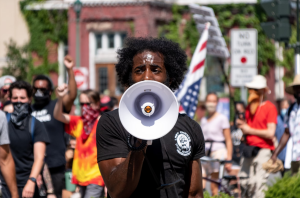The One Thing Men Must Do to Ensure the Survival of Humanity

In these times of personal and political conflict, there is one thing that most everyone agrees upon—humanity is in deep trouble. According to the most knowledgeable scientists in the world,
“We are at a time of unprecedented danger. It is 90 seconds to midnight.”
Founded in 1945 by Albert Einstein and University of Chicago scientists who helped develop the first atomic weapons in the Manhattan Project, the Bulletin of the Atomic Scientists created the Doomsday Clock two years later, using the imagery of apocalypse (midnight) and the contemporary idiom of nuclear explosion (countdown to zero) to convey threats to humanity and the planet. The Doomsday Clock is set every year by the Bulletin’s Science and Security Board in consultation with its Board of Sponsors, which includes 10 Nobel laureates. The Clock has become a universally recognized indicator of the world’s vulnerability to global catastrophe caused by manmade technologies.
This year, the Science and Security Board of the Bulletin of the Atomic Scientists moved the hands of the Doomsday Clock forward, largely (though not exclusively) because of the mounting dangers of the war in Ukraine. The Clock now stands at 90 seconds to midnight—the closest to global catastrophe it has ever been.
Few people want to accept how close we are to the end of humanity or that we really have a chance to turn the hands of the clock back before it strikes midnight and humans become the shortest-lived species in evolutionary history. If we continue feeling what we are feeling, thinking what we are thinking, and doing what we are doing, we are doomed. We may blow ourselves up or continue to heat up our planet until we destroy our environmental support system and cook ourselves to death. Or we may find some other way to check ourselves out of the community of life on planet Earth.
But before we give into despair, there is another choice we can make, one suggested not by world-class scientists like Albert Einstein, but by a female comedian named Elayne Boosler. She said,
“When women are depressed they eat or go shopping. Men invade another country. It’s a whole different way of thinking.”
Ms. Boosler points to some interesting possibilities:
- The root of our problem may be our collective belief that things are hopeless.
- Given the world we have created it is not surprising that both men and women can feel depressed and despairing.
- Women tend to turn their depression inwards and cause problems for themselves.
- Men tend to turn their depression outwards and cause problems for others.
- Believing men are bad and the cause of the world’s problems is understandable but does not help to change things for good.
- A change in our mindset must occur before we can bring humanity back from the eve of destruction.
More than anyone I know, Riane Eisler, offers a realistic way to turn back the hands of the Doomsday Clock before it is too late.
Riane Eisler: Tipping the Balance From Domination To Partnership
Riane Eisler is one of the world’s leading cultural historians and systems scientist. She is President and Co-Founder of the Center for Partnership Systems. She is internationally known for her bestseller The Chalice and The Blade: Our History, Our Future, now in 57 U.S. printings and 27 foreign editions. Her newest work, Nurturing Our Humanity: How Domination and Partnership Shape Our Brains, Lives, and Future, co-authored with anthropologist Douglas Fry shows how to construct a more equitable, sustainable, and less violent world based on Partnership rather than Domination.
I first met Riane Eisler in 1987 shortly after the publication of her book The Chalice & the Blade. I remember discussing our views on the future of humanity and the healing that needed to occur between men and women. My first book, Inside Out: Becoming My Own Man, had been published in 1983, in which I described my own healing journey. At a time when many female writers were blaming men for the problems in the world, I appreciated that Riane understood that the problem was not men, but the system of domination that harmed both women and men.
When I first read these words in The Chalice & the Blade, I was moved by their simplicity, vision, and truth:
“Underlying the great surface diversity of human culture are two basic models of society. The first, which I call the dominator model, is what is popularly termed either patriarchy or matriarchy—the ranking of one-half of humanity over the other. The second, in which social relations are primarily based on the principle of linking rather than ranking, may best be described as the partnership model. In this model—beginning with the most fundamental difference in our species, between male and female—diversity is not equated with either inferiority or superiority.”
More than most, Riane’s life experience has helped her recognize the destructive aspects of the Dominator System. In her book Nurturing Our Humanity, she describes her early influences and insights. When Riane was six, the German and Austrian Nazis took over her native Vienna. Riane’s father was dragged off by the Gestapo. Her mother miraculously obtained his release, and the family fled to Cuba.
With her move to the United States in 1946 came further formative experiences. As she and her parents arrived at last to the promised land of American liberty and equality, they found in Miami, their port of entry, yet another disempowered out-group, or “other.” In the rigidly segregated South of that time, they discovered one more variation of the all-too-familiar use of cultural narratives to justify the persecution and subordination of “inferior” beings.
I have been a friend and supporter of Riane’s work since we first met. Her Center is a beacon of hope for women, men, and humanity.
“The mission of the Center for Partnership Systems,” says Riane, “is to catalyze movement towards Partnership Systems on all levels of society through research, education, grassroots empowerment, and policy initiatives. CPS’s programs focus on promoting human rights and nonviolence, gender and racial equity, child development, and new metrics that demonstrate the financial contribution of the work of care.”
I was recently interviewed by Riane for the Center’s Power of Partnership Podcasts. My topic was “The Power of Partnership: Healing Men and Leaving Violence Behind.” I described my own healing journey and the work of myself and my colleagues who recently launched our Moonshot For Mankind.
The Moonshot for Mankind and What Men Can Do to Ensure the Survival of Humanity
At this stage of my career, spanning more than fifty years, I want to use the time I still have to make the most positive impact in the world.
Nearly twenty years ago, Randolph Nesse, MD and Daniel Kruger, PhD examined premature deaths among men in 20 countries. They found that in every country, men died sooner and lived sicker than women and their shortened health and lifespan harmed the men and their families.
They concluded with these powerful statements:
- “Over 375,000 lives would be saved in a single year in the U.S. alone if men’s risk of dying was as low as women’s.”
- “If you could make male mortality rates the same as female rates, you would do more good than curing cancer.”
- “Being male is now the single largest demographic factor for early death.”
When I first began working in the field of Gender-Specific Healing and Men’s Health more than fifty years ago, there were very few programs that worked effectively with men to improve the wellbeing of men and their families. Now there are many. Two years ago I invited a number of colleagues to join me in creating a Moonshot for Mankind in support of humanity.
Our group partnered with Dr. Jim Garrison and his team at Humanity Rising to present a series of on-line events July 25-28, 2023. We also shared our video about the Moonshot for Mankind and invited other individuals and organizations to join us. We also introduced a pledge that organizations and individual men can take.
The individual pledge was written by Frederick Marx, the internationally acclaimed, Oscar and Emmy nominated director, writer, and filmmaker. He says, “I envision thousands of men’s organizations worldwide partnering with us to sign and promote a simple Five-Point Men’s Wellness Vow:
- I will remain healthy in mind and body.
- I will nourish and grow my emotional awareness.
- I will become familiar with my internal darkness and never harm another man, woman, or child.
- I will ask for help and strive to live cooperatively, not competitively, with men.
- I will become the best man I can be, living with honor and pride in my masculinity.
This does not mean that women haven’t contributed to our dire situation or that women can’t create their own, similar, pledge in support of womankind and humanity. But think what it might mean if our two likely U.S. Presidential candidates took this Wellness Vow and put it into practice. Think what it would mean if the two presidents of Russia and Ukraine did the same. Think what the world would be like if everyone followed the Partnership practices that Riane Eisler has been developing for more than thirty-five years.
Could a simple action like taking and acting on this simple pledge be the key to ensuring the survival of humanity? We are committed to finding out. We invite you to join us at MoonshotforMankind.com. You can learn more about Riane’s work at the Center for Partnership Systems.
If you enjoy articles like these, please consider subscribing to our free newsletter at MenAlive.







